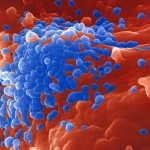Lien vers Pubmed [PMID] – 12218392
AIDS 2002 Sep;16(13):1799-802
OBJECTIVE: This study was undertaken to investigate the impact of highly active antiretroviral therapy (HAART) on the regression of cervical intraepithelial neoplasia (CIN) in HIV-infected women.
DESIGN: Prospective study of 168 HIV-infected women with evidence of CIN until regression to a lower grade or to normality (end-point) or until surgical treatment or last visit. Ninety-six patients received HAART.
METHODS: Women were examined every 6 months by Papanicolaou smears, colposcopy, and biopsy if required. The probability of CIN regression was calculated using survival analysis. HAART was entered as a time-dependent covariate according to the date of first prescription.
RESULTS: Regression of CIN was observed in 67 (39.9%) women. The probability of regression at 12 months was significantly higher for high-grade CIN [23.8%; 95% confidence interval (CI), 14.2-33.5] than for low-grade lesions (14.8%; 95% CI, 7.0-22.6) (P = 0.04). The risk of regression of CIN was twice as high in women receiving HAART as compared with women not receiving HAART (relative hazard of regression, 1.93; 95% CI, 1.14-3.29). There was a trend for a larger increase in CD4 cell counts among those women taking HAART and who showed regression as compared with those who did not regress.
CONCLUSION: The positive impact of HAART on CIN regression may be associated with some restoration of specific immune reactivity. This is not sufficient enough, however, to modify the gynecological follow-up of HIV-infected women.

